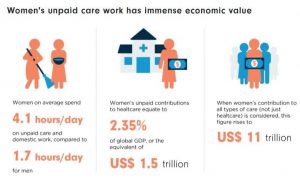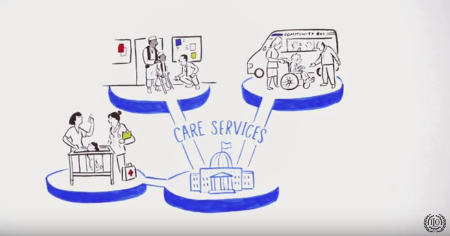This article is written by Aman Sagar, who is pursuing a Diploma in Labour, Employment and Industrial Laws (including POSH) for HR Managers from LawSikho.
“There is nothing more beautiful than someone who goes out of their way to make life beautiful for others.”
– Mandy Hale
Introduction
Care is the phenomenon that involves protecting someone or something and providing what may be expected by the required person, animal, or thing. Care could be for a living or a non-living thing and generally comes when there is a sense of attachment or responsibility towards something which often comes through intrinsic motivation and not merely from a financial growth standpoint. It is instrumental in making the world a better place to live and prosper that we all are a part of.
When it comes to caring work, it generally involves a set of activities that involve looking after somebody along with meeting their physiological, psychological, and emotional needs and helps in developing capabilities whether it is for an individual or a group. It entails what may be termed as a Social reproduction which may involve activities such as cleaning, cooking, teaching, nursing, and various other domestic services for people who need the necessary attention like the sick, the disabled, the differently-abled, the elderly people, the young ones, etc. The key feature to this pedigree of care providers is that it involves human interaction despite leveraged through the use of technological innovations. The pandemic has only reinforced the importance of care workers and it becomes all the more important for us to celebrate and reward their achievements.

History of care work
If we turn our page to the history of care providers it all began with Hippocrates, also known as the Father of Medicine who was responsible for the shift of health care from the crutches of superstition and religious beliefs and into science. He also led people into taking the holy oath which promotes ethical behavior of medical practitioners towards their patients.
Indian culture has always placed importance on respecting and devoting oneself to the teachers (Gurus) since ages past, also inscribed in the holy Vedas and Upanishads and it is this noble profession that involves nurturing, mentoring, sharing of divine knowledge and wisdom which led to the overall development of the student.
There are innumerable examples that we can put across but humanitarians like Florence Nightingale- the lady with the lamp, Mother Teresa, and many more who had dedicated all of their lives towards helping the wounded, the sick, and the impoverished are the ones whose names almost all of us are aware of. Their efforts can seldom be recompensed in any form.
Is care work majorly restricted to the female gender?
Invariably, it is the female gender that is disproportionately associated with this vital activity. The word ‘care’ is extensively associated with mothers and grandmothers. They are considered to be the embodiment of empathy known for putting others’ needs ahead of themselves. Although this statement is up for an argument, because the females experience childbirth, keeping the child in their womb for a long duration of 9 months which is a part of their body and by enduring pain and miracle of a new being coming out of them, care comes naturally from them as compared to the males.
The division of work was always biased and never decided mutually at a house because of the inherent male-dominated societal norms that are evident in the number of care providers. And this trend is not something that is not restricted to certain societies, it is almost everywhere to be seen.
Let us take a peek at the numbers, with 380+ million workers comprising the care economy, almost 250 million are females which is approximately 66%, and 130 million are males. Due to taking a back seat in their careers in the name of nurturing the family the females often experience disparities in growth and pay when compared with their male counterparts. It is therefore very important to give equal opportunity to both genders to prove their self-worth and despite females taking the necessary maternity breaks, it is imperative for the organizations to see things from a grey perspective instead of taking a black and white approach and offering some latitude. Giving women equal opportunities.
Given below within the infographic chart is a representation of the valuation of the contribution made by the unpaid women care workers at a global level.

Challenges faced by the care economy
The care economy, irrespective of how much they do for the sake of the well-being of people whether it is through saving of human lives as a healthcare provider, teaching more than 200 students in a day as a teacher, or cooking all 3 meals of the day for a household as a mother often gets little praise or appreciation they deserve. The massive expanse of voluntary and poorly paid care and domestic work that women have done at all times is the spine of the response to COVID-19. Unpaid family care providers, community-based medical workers along long-term care workers are all essential workers in this once-in-a-century crisis but hardly recognised.
There is almost always a deficit in the supply of quality paid care workers because of numerous factors that include low salary, lack of benefits, the long working hours these jobs are built with low social status and no sense of job security due to lack of legislation. The ratio of a care provider to the people they cater to has typically been very high due to the lack of supply of care workers. In fact, the care workers in India are not defined rightly and the majority might still be considered as a part of the unorganised workforce.
Impact of COVID-19 on care economy in India
During the current scenario in May 2021 when the world and especially India was experiencing an absolutely repugnant situation with the second wave of the novel Coronavirus ripping into the population with almost 4000 to 5000 daily fatalities and more than 4 lakh plus positive cases being reported every single day, we’re seeing a massive breakdown of health care system with hospitals being flooded with patients and their family members running from pillar to post to somehow gets their hands on some basic hospital supplies such as Oxygen cylinders, ventilator systems, Oxygen concentrators and doses of necessary drugs to keep patients alive like Remdesivir, Tocilizumab, etc.
While it is heartbreaking to see this crisis for which we ourselves are to be blamed because we let our guard down and did not pay heed to the gravity of the situation when there was a need to keep our efforts consistent in containing this pandemic for the greater good of our brothers and sisters of this nation. But on the frontline are standing our care workers/ warriors who have been working day and night at the expense of sleep, lives to help every last patient with the help of whatever they can. It is high time that this section of workers receives its due credit and we support them whether it is through financial bailouts, emotional support, recognizing their efforts in public forums, etc. The ongoing scarcity of healthcare workers is especially a raging issue and by the time this horror gets over we may as well realize the value of this profession or the pedigree of people.
The way forward
The need of the hour is for the government to create an identification mechanism for care economy workers with the help of creating a pipeline that could potentially be used to reach them and categorise them or bring a sense of structure to the whole system. Once there is a definition that is articulated, an individual that is identified as a care worker must be allotted a specific job ID card.
This specified job ID card ensures the government or the appropriate body to issue benefits and help them to transfer its social security payments to care workers, as stated in the newly formed labour codes but will also help create a network of these workers.
This very official network could also help match caregivers with care pursuers, creating a better sense of accountability. All of these could encourage more policy-related work in the care economy highlighting the existing gaps to be connected to boost more employability into the care economy network.
Creating appropriate committees in place involves a mix of government and corporates which may regularly review and reinforce the importance and execute towards increasing more and more workers with a structured approach.
Also, it will be in the public interest if a known mass celebrity/leader/icon should be a brand ambassador of a well-organised nationwide campaign to highlight the importance and make this a big success. Since Indian people are fond of drama, it wouldn’t hurt to make a bold move towards highlighting the importance of this agenda.
Conclusion
If the care economy is paid its due attention then this move will be a massive catalyst in driving inclusive growth in India. Validation would help create a safe environment and force the necessary compliance of adherence to minimum wage standards, giving the right value towards care work. And if we speak from a long-term perspective, this step could help place more value on even the non-paid care work, which may lead to an equitable division of work at home and bringing a sense of order/balance. This will be a big step towards sustainable development and lead to open a world of good to India.
References
- https://www.orfonline.org/expert-speak/the-need-to-care-about-the-care-economy/
- https://data.unwomen.org/features/covid-19-sends-care-economy-deeper-crisis-mode
- https://www.ilo.org/global/publications/books/WCMS_633135/lang–en/index.htm
- https://blogs.lse.ac.uk/southasia/2020/07/27/the-need-for-a-gender-responsive-economy-in-the-aftermath-of-covid-19-in-india/
- https://indianexpress.com/article/opinion/care-economy-india-recognise-invest-care-work-7273537/
- https://www.thehindubusinessline.com/opinion/columns/care-economy-uncharitable-to-women/article29619795.ece
Students of LawSikho courses regularly produce writing assignments and work on practical exercises as a part of their coursework and develop themselves in real-life practical skills.
LawSikho has created a telegram group for exchanging legal knowledge, referrals, and various opportunities. You can click on this link and join:
 Serato DJ Crack 2025Serato DJ PRO Crack
Serato DJ Crack 2025Serato DJ PRO Crack










 Allow notifications
Allow notifications


